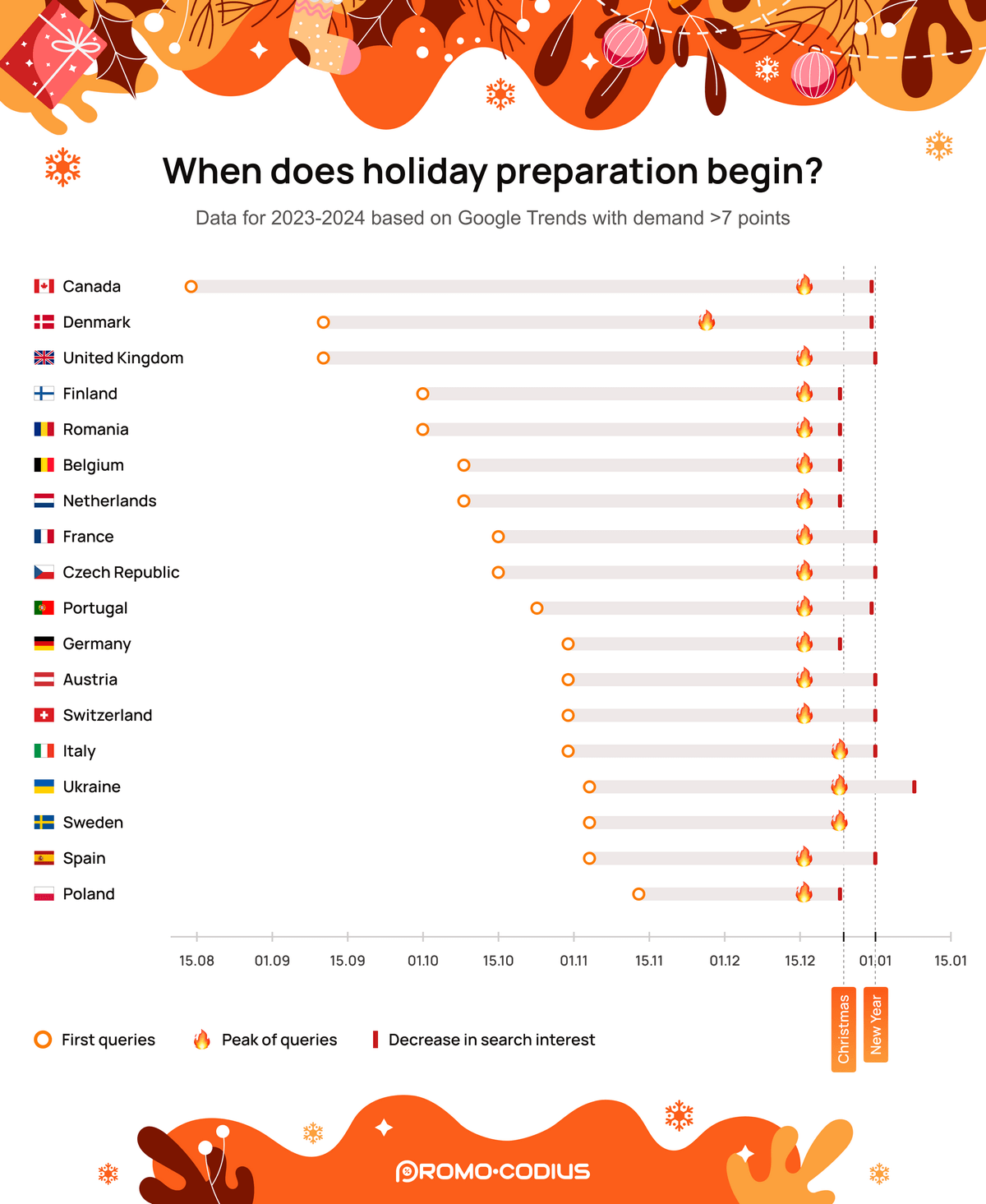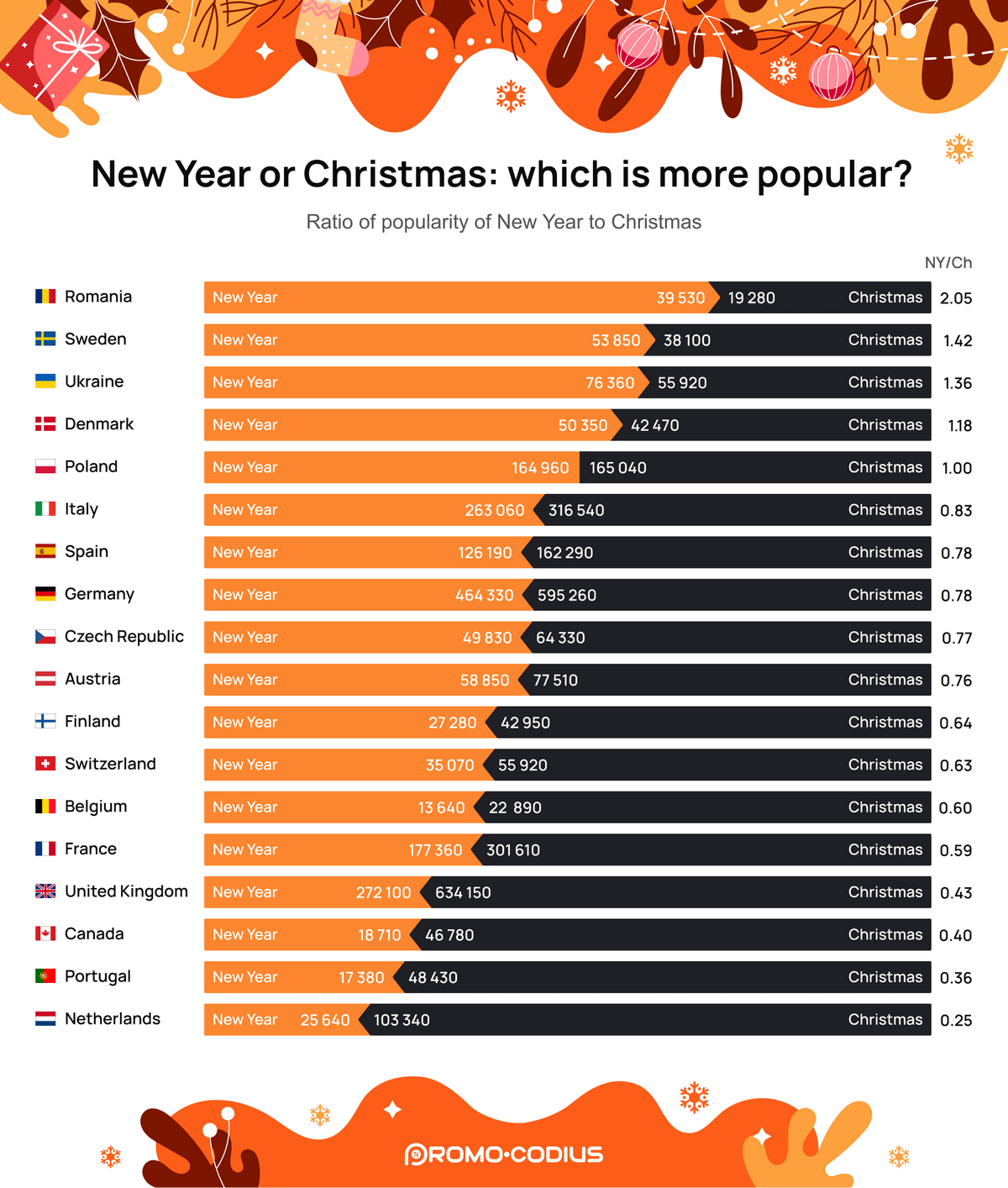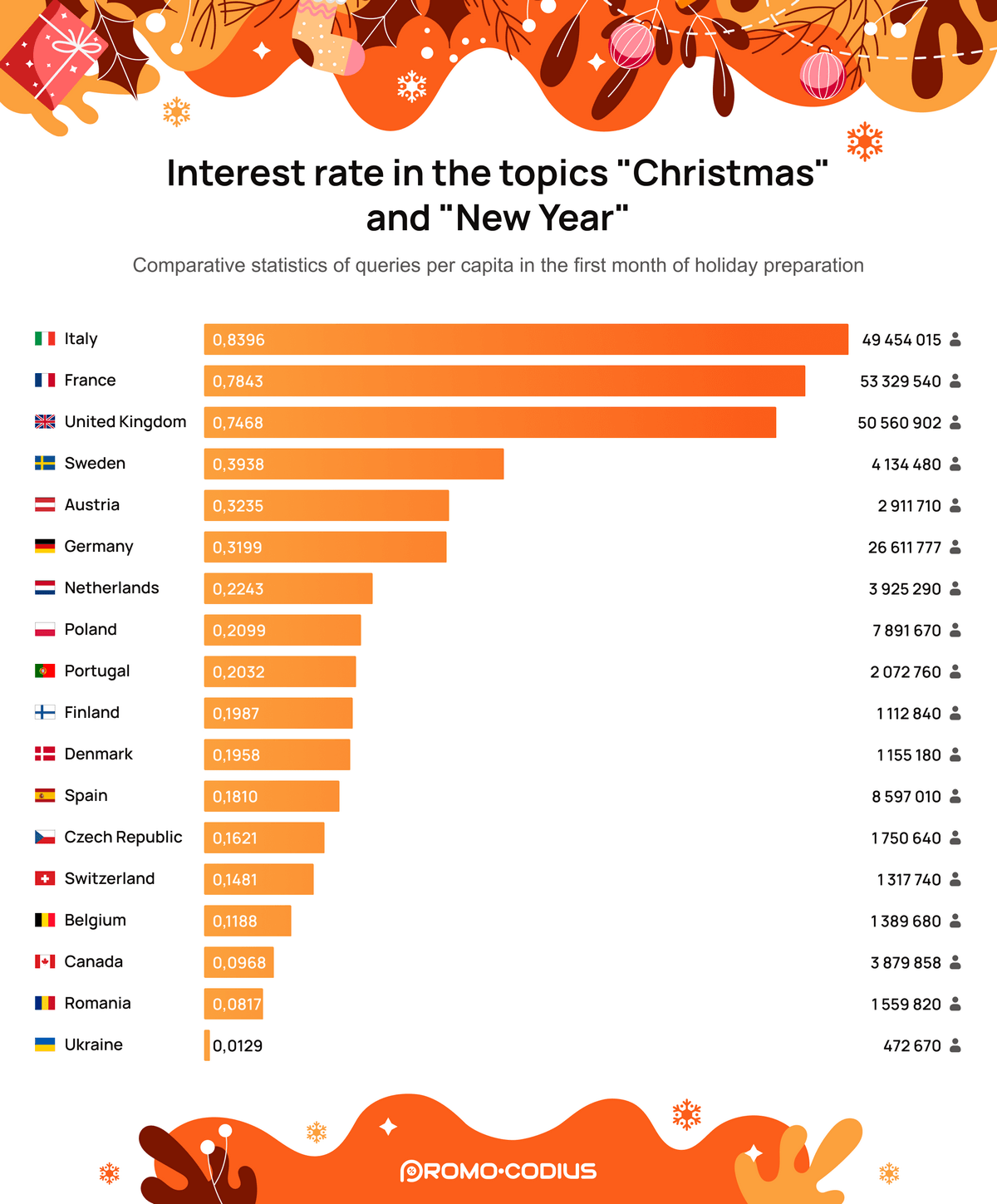Festive Season in the UK: Consumer Behaviour and Spending Trends for Christmas and New Year
The holiday season in the United Kingdom has always been a time of joyous celebration, steeped in traditions of gift-giving, elaborate meals, and gatherings with loved ones. As Christmas and New Year approach, consumer behaviour and spending trends reveal much about how British people prepare for this cherished period.
Despite recent economic pressures, the UK continues to uphold vibrant holiday traditions, with early preparations, considerable spending on gifts and festive foods, and a mix of both traditional and emerging trends.
Let's take a closer look at these Christmas trends in the UK, comparing them with those in other countries, to get a better understanding of what makes our holiday season unique.
Early Preparations: When Do Britons Start Thinking About Christmas Compared to Other Nations?
In the UK, Christmas preparations begin surprisingly early. According to research by Mintel1, over 50% of consumers start buying gifts by November, with 25% beginning even earlier, in September or before.
This early shopping behaviour is driven by several factors. One key reason is the desire to spread out the financial burden, especially as economic uncertainty has made budgeting more critical. Additionally, early shoppers often look to take advantage of sales and promotions, such as Black Friday and Cyber Monday deals.
The popularity of early gift-buying is also reflected in search trends. The Google Trends data indicates that the UK sees a spike in Christmas-related searches as early as October, with a steady increase leading into November. This aligns with Mintel's findings2, which highlight that UK shoppers aim to avoid the last-minute rush and the potential stock shortages associated with leaving holiday shopping too late.
In October, all the stores in the UK are already rolling out festive decorations and Christmas adverts start to appear on television. While many Brits start planning gifts and gatherings around this time, the overall approach is more gradual compared to some other countries.
For example, in Denmark, Christmas preparations kick off even earlier, often beginning as soon as late September. This early start reflects a strong focus on festive decor and gathering essentials, with many households dedicating significant time to preparing their homes for the season.
In Belgium and Finland, the holiday season begins in October, though often a bit later than in France. People embrace the festive spirit early, focusing on both decorations and community events, creating a festive atmosphere that builds over several months.
By contrast, Italy tends to start holiday preparations in late October. Italians, like the British, enjoy a more relaxed build-up, but they may place a bit more emphasis on traditional markets and community festivities as the season progresses.
On the later side, countries like Romania and Poland don't dive into Christmas preparations until mid-November. This shorter preparation period often results in a focused, last-minute approach, where gift-buying and holiday planning ramp up in the final weeks leading up to Christmas.
Overall, the UK falls somewhere in the middle — earlier than Romania and Poland but not as early as France — reflecting a balanced approach to holiday preparations that allows time for both festive anticipation and practical planning.

Who in Europe Has the Greatest Interest in Christmas?
In the UK, Christmas remains a beloved holiday, and every year Brits take to the internet in search of inspiration for holiday traditions, gifts, and festive food.
According to Promo-Codes research, the combined number of searches related to Christmas and New Year in the UK surpasses 50 million. The UK, alongside France, Germany and Italy, ranks among the top European countries with high interest in Christmas, with a majority of searches centered on family gatherings, traditional dishes, and thoughtful gifts.
By contrast, countries such as Romania display a stronger interest in New Year's celebrations. In Romania, the focus on New Year's surpasses Christmas, with a popularity coefficient of 2.05, indicating that New Year's traditions hold a prominent place in the holiday season. This difference highlights cultural priorities, with countries like the UK focusing heavily on Christmas as a family-centered holiday, while others emphasize the communal and celebratory aspects of New Year's.
Countries like Portugal and Belgium exhibit a moderate level of interest in Christmas compared to the UK and Germany. In the UK, traditions like Christmas markets, holiday light displays, and festive gatherings reflect a deeply rooted culture of celebration that includes both nostalgia and festivity. In Portugal and Belgium, although Christmas is celebrated warmly, the scale of holiday preparation and search volume is somewhat lower, possibly due to regional variations in holiday traditions.

New Year as an Extension of the Christmas Season
In the UK, New Year's Eve is popular, often celebrated with large public events, fireworks, and social gatherings. However, it is generally viewed as an extension of the Christmas season rather than a standalone holiday. Unlike countries such as Ukraine and Sweden, where New Year's takes center stage as the primary winter celebration, the UK's focus remains firmly on Christmas as the pinnacle of the festive season.
British consumers prioritize Christmas for family-centered spending. Searches for Christmas food and recipes alone account for over 11 million inquiries, reflecting a deep focus on festive meals and traditions. In contrast, the UK shows a preference ratio of 0.43 for New Year-related searches compared to Christmas, underscoring that New Year's is seen more as a social event than a family-focused holiday.
Spending for New Year's is directed more toward entertainment and dining out rather than family gifts and home-centered gatherings, as is typical for Christmas. This balance underscores Christmas as the heart of the UK's holiday season, with New Year's providing a lighter, celebratory close to the festivities.

Key Search Interests: What Do People Look For During the Holidays?
Promo-Codes research data shows unique trends in holiday-related search interests across different countries. In the UK, Christmas searches are diverse, focusing on both traditional elements and modern ideas.
Here are the top search categories in the UK, compared to trends in other countries:
- Songs and Carols: In the UK, the most popular holiday search is for Christmas songs and carols, highlighting the tradition of festive music that is central to British Christmas culture. This is in contrast to France, where festive recipes hold the top spot, reflecting a strong culinary emphasis on the holiday.
- Recipes: Searches for holiday recipes closely follow interest in music in the UK, where classics like roast turkey, Christmas pudding, and mince pies are frequently searched. Similarly, Germany also sees high interest in recipes, though focused on regional favorites like Stollen and gingerbread.
- Gift Ideas: Gift-related searches are also popular in the UK, especially for men, such as husband, boyfriend or father, reflecting a desire for thoughtful, personalized presents which is similar to Poland and Finland.

Comparative statistics of search volumes according to Google Ads data (peak demand is indicated)
| What to cook | Entertainment | Gifts | What to watch | Holidays/Weekends | Songs/Carols | Promotions/Sales | |
| United Kingdom | 168 990 | 45 030 | 818 170 | 3 600 | 248 600 | 95 070 | 10 220 |
| Belgium | 11 900 | 4 490 | 37 430 | 235 430 | 43 790 | 138 170 | 1 460 |
| Canada | 28 110 | 960 | 1 330 000 | 192 000 | 3 310 | 3 600 | 1 840 |
| Denmark | 2 098 000 | 8 150 | 1 008 008 | 471 280 | 16 150 | 272 910 | 5 360 |
| Finland | 532 900 | 850 | 515 480 | 141 300 | 8 780 | 115 940 | 2 490 |
| Romania | 688 790 | 10 270 | 275 560 | 434 930 | 107 490 | 205 160 | 28 440 |
| Netherlands | 3 111 140 | 28 920 | 1 039 000 | 389 020 | 40 490 | 3 450 000 | 538 440 |
| France | 3 240 | 470 | 743 870 | 185 870 | 9 210 | 212 310 | 210 |
| Czech Republic | 148 860 | 1 480 | 570 840 | 37 910 | 26 770 | 326 070 | 910 |
| Portugal | 1 093 000 | 2 170 | 739 000 | 192 190 | 3 660 | 36 570 | 6 170 |
| Germany | 633 970 | 3 360 | 553 900 | 948 470 | 641 870 | 5 081 000 | 29 100 |
| Austria | 596 010 | 7 570 | 2 305 300 | 19 630 | 585 400 | 407 480 | 3 900 |
| Switzerland | 9 863 000 | 22 300 | 11 460 000 | 2 747 477 | 265 320 | 2 241 000 | 12 680 |
| Italy | 1 190 000 | 1 580 | 1 184 000 | 257 920 | 19 600 | 255 990 | 2 620 |
| Ukraine | 183 870 | 40 | 3 575 800 | 207 750 | 790 | 165 370 | 860 |
| Sweden | 11 644 400 | 401 070 | 11 432 000 | 10 864 000 | 1 568 432 | 13 200 000 | 1 451 000 |
| Spain | 30 220 00 | 203 980 | 15 053 000 | 2 518 000 | 2 375 000 | 2 876 000 | 83 560 |
| Poland | 14 541 000 | 130 230 | 21 304 000 | 6 278 000 | 1 000 035 | 6 123 030 | 77 720 |
Holiday Spending in the UK: Budget Allocation and Trends
Despite economic challenges, including inflation and rising living costs, British consumers are determined to maintain their holiday traditions with spending primarily focused on gifts, food, and social activities.
- Gift Spending: The average UK household is set to spend around £548 on Christmas gifts, a figure that has remained relatively stable despite financial pressures. Clothing, cosmetics, and books are among the most popular gift items. According to Mintel3, 68% of UK consumers plan to buy clothes as gifts, while 55% will purchase beauty products, and 40% opt for books. An emerging trend is the rise in popularity of experience-based gifts, such as concert tickets or travel vouchers, especially among younger generations. This reflects a growing preference for creating memories over acquiring material items.
- Food and Drink Expenditure: Food and drink are pivotal to Christmas celebrations in the UK. The traditional Christmas dinner, featuring turkey, roasted vegetables, Christmas pudding, and a variety of beverages, is an integral part of the festive experience. According to Kantar4, take-home grocery sales over the holiday period reached £31.7 billion, with a peak of £11.7 billion in the final weeks of December alone. Alcohol sales are also a significant contributor to holiday spending, with wine, beer, and spirits sales surging by up to 20% in December compared to other months. The tradition of festive drinks, including mulled wine and champagne, remains strong, and local British wines and craft beers have seen a surge in popularity.
Shopping Channels: The Online vs. In-Store Debate
The way Britons shop for Christmas has evolved significantly over the past decade. The rise of e-commerce has transformed holiday shopping habits, with online sales representing a substantial share of total Christmas expenditure. However, there is an emerging trend of consumers returning to physical stores. In 2023, Deloitte's research5 found that 50% of UK consumers plan to shop in-store for gifts, up from 47% in 2022, the trend is forecasted to be kept in 2024. The reasons for this shift include the desire to experience the festive atmosphere, the convenience of seeing and touching products before purchasing, and concerns over delivery times and costs.
That said, online shopping remains essential, especially for younger generations. Data from the Office for National Statistics (ONS)6 indicates that 65% of 25- to 34-year-olds prefer shopping online for the holidays, citing convenience and access to a broader range of products. The most popular e-commerce platforms include Amazon, John Lewis, and Argos, which have all seen significant traffic increases in the lead-up to Christmas.
Another growing trend is hybrid shopping, where consumers research products online before purchasing them in-store. This behaviour is particularly prevalent among tech-savvy millennials and Gen Z shoppers, who often use price comparison websites and read online reviews before committing to a purchase.
Christmas Entertainment and Activities
Christmas in the UK is not just about gifts and food; it is also a time for entertainment and social gatherings. The popularity of festive activities is evident in search trends. According to Google data, searches for "Christmas markets near me" and "festive events in London" peak in early December. The UK's love for holiday entertainment is further exemplified by high attendance rates at pantomimes, Christmas carol services, and winter festivals. For example, Winter Wonderland in Hyde Park attracts over three million visitors each year, making it one of the most popular holiday events in Europe.
Television and Streaming
The holiday season is also a time for watching Christmas specials and movies. Data from BARB7 (Broadcasters' Audience Research Board) shows that viewership for classic Christmas films, such as Home Alone and Love Actually, spikes significantly in December. Additionally, streaming platforms like Netflix and Disney+ have seen a rise in holiday-themed content consumption, with millions tuning in for festive movie marathons.
Gift-Giving Traditions: Who Receives What?
Gift-giving in the UK is a well-loved tradition, and the preferences for who receives gifts are telling. Britons prioritize a mix of gifts during Christmas. Searches for general Christmas presents lead the way (searches like Christmas gifts, ideas for presents etc.), accounting for 36.17% of demand. Searches for gifts for men (20.36%) and women (15.65%) are popular, highlighting thoughtful choices for partners.
Secret Santa gifts searches are also significant, making up 17.48%, often chosen for workplace or friend exchanges. Family-oriented searches for parents (8.56%) and children (7.82%) reflect the importance of celebrating with loved ones. Finally, gifts for friends searches comprise 4.03%, emphasizing the value of close friendships during the festive season.
Deloitte's research8 also highlights a growing trend of “self-gifting,” where people buy presents for themselves during the holiday season. Around 18% of UK shoppers admit to indulging in self-gifting, often in the form of luxury items or wellness products.
Summing up the Spirit of Christmas in the UK
The holiday season in the UK remains a time of joy and celebration, deeply rooted in traditions while also embracing modern trends. Despite economic challenges, British consumers continue to invest in making Christmas and New Year memorable. From early preparations and thoughtful gift-giving to sumptuous meals and festive gatherings, the UK exemplifies the enduring magic of the festive season. As we approach another Christmas, it is clear that the spirit of celebration is alive and well, adapting to the times while holding onto cherished customs.
- Christmas Shopping Trends in the UK — Mintel
- Consumer Spending Outlook this Holiday Season — Mintel
- UK Christmas Gift Buying Market Report 2023 — Mintel
- Grocery sales hit £11.7 billion as Brits splash out on Christmas — Kantar
- Rise in consumers planning to spend more this Christmas — Deloitte
- Share of individuals who made purchases online in Great Britain from 2012 to 2020, by age — Statista
- I wish it could be Christmas every day — Barb
- Rise in consumers planning to spend more this Christmas — Deloitte